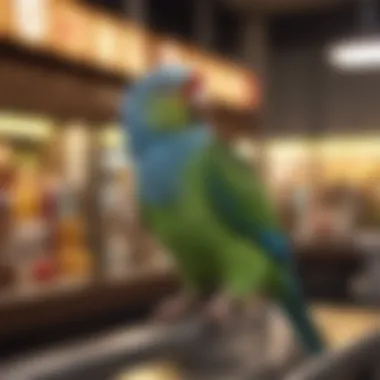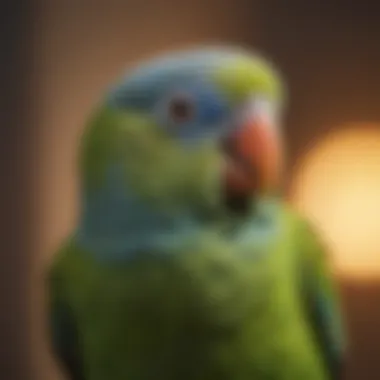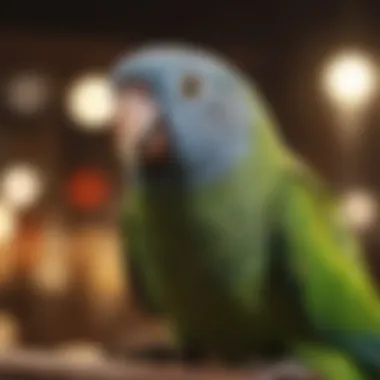Where to Buy Parakeets: Your Ultimate Guide


Intro
Buying a parakeet involves several considerations beyond the simple desire for a colorful pet. These small birds are known for their social nature and intelligence. However, understanding their needs and finding reputable sources is crucial for a successful ownership experience. This guide aims to assist potential parakeet owners in making informed decisions.
Understanding Your Pet
Knowing the behavior and needs of parakeets is essential. These birds exhibit unique traits that require specific understanding and care consideration.
Pet Behavior Basics
Parakeets, or budgerigars, are sociable creatures. They thrive on interaction both with their owners and with other birds. A solitary parakeet can become bored and develop behavioral issues. Regular social interaction is vital for their mental health.
Common Breed Characteristics
Different parakeet varieties can have distinct features. For example, the American parakeet is often larger and comes in various colors. The English budgerigar is generally known for its more docile temperament. Understanding these characteristics can help potential owners choose the right bird for their lifestyle.
Species-Specific Needs
Each species of parakeet has specific requirements in terms of habitat, diet, and stimulation. Typically, they require spacious cages with adequate perches and toys to encourage movement. A varied diet will also support their overall health.
Pet Care and Maintenance
Caring for parakeets involves several aspects that owners must manage to maintain their health and happiness.
Feeding Guidelines
A proper diet for parakeets includes seeds, pellets, fruits, and vegetables. It is important to avoid foods that are toxic to birds, such as avocado and chocolate. Fresh water should always be available.
Grooming Essentials
Regular grooming is necessary to keep parrots healthy. Owners should trim their nails and check for any feather issues. Periodic bathing is also recommended to support their skin health.
Hygiene Practices
Maintaining a clean living environment is crucial. Cage cleaning should occur weekly. Ensure the food dishes and water bottles are clean daily.
Training and Development
Training parakeets is not only beneficial but also enjoyable for both the bird and the owner.
Basic Commands and Skills
Start with simple commands. Teaching them to step up on a finger and respond to their names are good initial skills. Positive reinforcement will help in training them effectively.
Behavioral Training Techniques
Behavioral issues such as biting may arise due to fear or discomfort. Slow exposure to new situations or environments can help them adjust.
Addressing Common Behavior Issues
Potential issues may stem from boredom. Providing toys and activities can keep them stimulated and reduce unwanted behaviors.
Health and Wellness
A focus on health is key for parakeets. Regular veterinary care cannot be overlooked.
Routine Vet Check-ups
Annual check-ups with an avian vet are suggested. This helps detect any health concerns early.
Vaccination Needs
Like any pet, parakeets may require vaccinations. Consult with a veterinarian for specific recommendations.


Recognizing Signs of Illness
Be alert for symptoms such as lethargy, changes in eating habits, or feather loss. Early detection is pivotal in addressing health problems effectively.
Enrichment and Activities
Engaging a parakeet's mind and body is vital for their happiness and health.
Indoor vs.
Outdoor Activities
While indoor play is essential, supervised outdoor time can provide new experiences. However, always ensure they are safe from predators.
Interactive Toys and Games
Toys that require problem-solving or physical activity can enhance a parakeet's life. Regularly rotate toys to keep their environment stimulating.
Socialization Opportunities
Encouraging interactions with humans and other birds helps develop their social skills. Consider multiple parakeets if space allows, as they naturally form bonds with fellow birds.
Understanding the comprehensive needs of a parakeet lays the foundation for a rewarding ownership experience. Knowledge of their specific requirements, along with proper care and attention, ensures a happy and healthy pet.
Understanding Parakeets
Understanding parakeets is essential for anyone considering adopting these vibrant birds. Parakeets, often referred to as budgerigars or budgies, are widely known for their sociable nature and playful demeanor. They are small, colorful, and can be trained to mimic human speech, which adds to their appeal. Knowing about parakeets helps potential owners make informed choices regarding their care and environment, ensuring a fulfilling companionship.
What Are Parakeets?
Parakeets are small, long-tailed birds that belong to the parrot family. They originated from Australia, where they thrive in large flocks. The most common type, the budgerigar, displays a range of bright colors, including green, blue, yellow, and white. Parakeets are known for their intelligence and curious personalities. They can develop strong bonds with their owners and can live up to 10 years or more with proper care.
Their social nature is a significant factor to consider. Parakeets require interaction to stay healthy and happy. A solitary bird can become bored or stressed without companionship. Thus, one must contemplate their lifestyle and time availability before bringing a parakeet into their home.
Popular Parakeet Breeds
Many breeds of parakeets exist, each with unique traits. The budgerigar stands out as the most popular due to its affectionate nature and vibrant colors. Other notable breeds include:
- American Parakeet: Slightly larger than budgies, with plumper bodies and ranges in color.
- English Budgerigar: Known for its larger build and potential show qualities, often bred for competitions.
- Indian Ringneck: Features a distinctive ring around the neck and is known for its talking abilities.
- Cockatiel: Not technically a parakeet, but shares many traits and is often found in similar households.
Each breed has specific care requirements and traits, making it critical to research before purchasing. Knowing the breed can also help owners anticipate behavior and care needed.
When contemplating a parakeet purchase, consider the characteristics of each breed. This knowledge aids in choosing the right companion that fits well with your lifestyle and environment.
The Importance of Buying from Reputable Sources
Purchasing a parakeet is a significant decision that requires careful consideration. The environment and conditions these birds live in before arriving at your home can affect their health and behavior. Buying from reputable sources ensures that you are not only acquiring a pet but also contributing to ethical practices within the pet industry. This section highlights why sourcing from trusted suppliers is crucial and the different aspects you should consider.
Risks of Unverified Suppliers
When acquiring a parakeet from an unverified supplier, several risks come into play. First, there is the potential for health issues. Many birds sold in less reputable settings may not receive the proper veterinary care, leading to underlying health problems that may not be immediately apparent. A sick bird can later require increased medical attention, which could become costly.
Furthermore, unverified sellers may engage in unethical breeding practices. Birds produced in substandard conditions often experience stress and poor socialization, which can manifest in negative behavioral traits. Additionally, there is a risk of supporting illegal wildlife trade. Purchasing a parakeet from unregulated suppliers can inadvertently encourage wildlife trafficking, leading to further exploitation of birds.
To mitigate these risks, potential owners should do thorough research, read reviews, and seek recommendations from other bird owners. Checking the credentials and reputation of a seller plays a vital role in ensuring a healthy and happy bird.
Ethical Considerations
The ethical implications of bird purchases cannot be overlooked. Choosing to buy from reputable breeders, pet stores, or rescue organizations is a reflection of responsible ownership. Birds raised in humane environments receive proper diet, socialization, and care, contributing to their overall well-being. In contrast, birds that come from neglectful settings may have various issues, impacting their quality of life.
Adopting from animal shelters or rescues presents a compassionate choice. It allows owners to provide a home for birds that may have faced abandonment or mistreatment. Ethical considerations extend beyond the birds themselves; they also reflect the values and responsibilities of pet ownership. By making informed decisions, buyers can foster a positive community around the care of parakeets and other companion animals.
Every purchase choice influences the broader community of bird welfare and sustainability.


Understanding the importance of sourcing from reputable places is essential. Taking the extra time to verify suppliers ultimately leads to a better experience for both the bird and the owner.
Where to Buy Parakeets
When considering acquiring a parakeet, understanding where to buy these birds is crucial. This section aims to provide potential owners with a breakdown of various purchasing options, including benefits and considerations for each. Knowing the strengths and weaknesses of these avenues will help you make an informed decision.
Pet Stores
Evaluating Local Options
One of the first places many prospective parakeet owners consider is the local pet store. Evaluating these options allows you to see the birds in person. This gives you a chance to assess their living conditions, health, and social behavior. It is also possible to talk directly with staff, who often have valuable insights into the care and temperament of different parakeet breeds.
Pet stores usually have a variety of species available. However, the experience can vary widely. Some may prioritize the welfare of animals while others may focus more on sales. Therefore, it is essential to evaluate the reputation of the specific store you are considering. A well-reviewed store can provide both quality birds and good customer support.
Understanding Pricing
Understanding pricing is also an important factor when buying from pet stores. Prices can vary significantly based on the breed, age, and health of the bird. Generally, parakeets can range anywhere from twenty to one hundred dollars.
One benefit of buying from a pet store is the potential for instant ownership. You can usually take the bird home right after payment. However, be cautious; higher prices do not always guarantee better health or care. It's advisable to compare prices across different stores, and assess the quality of the birds offered as well.
Breeders
Finding a Responsible Breeder
If you prefer a specific breed or want a young parakeet, considering breeders is a good option. Finding a responsible breeder can ensure that you procure a healthy bird with a known lineage. This path often comes with the added benefit of receiving a bird that has been socialized correctly,
A responsible breeder will often take great care to maintain the health and well-being of their birds. They will provide you with information regarding the bird's diet, care requirements, and temperament. Always look for reviews and testimonials before deciding on a breeder, as this can indicate their level of professionalism.
Questions to Ask a Breeder
Having a set of questions prepared can greatly enhance your experience when meeting a breeder. Ask about their breeding practices, health checks, and whether the birds have been socialized with humans. It's also good to inquire about the bird's parents to understand temperament traits.
By asking relevant questions, you can clarify any concerns and also establish rapport with the breeder. A knowledgeable and approachable breeder is often a sign of someone who genuinely cares about their birds, making them a suitable option for your purchase.
Online Pet Retailers
Benefits of Online Shopping
In today’s digital age, online pet retailers offer a convenient option for buying a parakeet. This marketplace allows you to browse multiple breeds and types without geographical limitations. One key advantage is the ability to compare prices and read customer reviews at your own pace.
Online shopping may also provide access to unique species that may not be readily available in local stores. However, this option comes with its challenges as well; the most crucial being the inability to physically examine the bird before purchasing.
Ensuring Safe Transactions
Ensuring safe transactions is vital when purchasing online. Always choose reputable online retailers that offer guarantees or return policies. Check their shipping methods to confirm the safety and comfort of the bird during transit. Look for websites that provide detailed information and customer support, as these aspects usually indicate a higher level of service.
Successful online purchases often depend on thorough research and an understanding of seller reputation.
Animal Shelters and Rescues
Advantages of Adoption
Adopting a parakeet from an animal shelter or rescue can be a fulfilling experience. There are several advantages to this approach, including the potential to provide a home to a bird in need. Shelters often have various breeds, and adoption fees tend to be lower than those in pet stores or breeders.
Adoption can lead to greater satisfaction knowing that you are contributing positively to the community. Furthermore, many shelters perform health assessments and vaccinations, which adds an extra layer of security in terms of the bird's well-being.
Assessing Available Options
When assessing available options at shelters, it is a good idea to look at the birds’ behavior and health conditions. Visit multiple shelters to find a bird that fits your lifestyle. Interacting with the birds before making a decision can establish whether a particular parakeet's personality aligns with your expectations.
Additionally, shelters sometimes provide valuable information on the birds' histories and needs, which can aid your decision-making process.
Key Considerations When Buying a Parakeet


When considering acquiring a parakeet, several vital aspects to take into account are crucial for both your satisfaction and the bird’s well-being. Understanding these considerations helps potential owners identify the right fit for their lifestyle and ensures responsible pet ownership. This section explores environment assessment, age and health, as well as temperament and behavior. Each element significantly affects the integration of a parakeet into your home.
Assessing Your Environment
The first step in bringing a parakeet into your life is to assess your environment. A parakeet needs a safe space to thrive. Consider the following factors:
- Space Requirements: Ensure your home has enough room for the birdcage and space for the bird to fly and exercise.
- Noise Levels: Parakeets can be loud. Assess if your living situation can handle the noise, especially if you live in an apartment.
- Temperature and Safety: Maintain a stable temperature in the home. Avoid areas with drafts or direct sunlight.
- Other Pets: If you have other animals, consider if they are friendly or predatory towards birds.
Evaluating these conditions will prepare you for adopting a parakeet and can influence the health and happiness of your new companion.
Understanding Age and Health
Age and health status are crucial considerations when buying a parakeet. Young birds may need more training and socialization but can also be more adaptable. Here are some points to think about:
- Age of the Bird: Young parakeets, often between 8 and 12 weeks, are easier to train and socialize. Older birds may have developed quirks or health issues.
- Health Status: Check for any signs of illness. Healthy birds should have clear eyes, vibrant feathers, and an active demeanor. Always request health records from breeders or stores.
- Veterinary Check-Ups: It is advisable to take your new parakeet for a vet check soon after purchase to ensure it is free from diseases.
Being informed about age and health can significantly affect your decision-making process.
Temperament and Behavior
Understanding the temperament and behavior of parakeets before buying is essential. Each parakeet has its unique personality which can align differently with potential owners:
- Social Nature: Parakeets are naturally social birds. Those raised alone may require more attention to become well-adjusted pets. Consider if you are prepared for that commitment.
- Activity Level: Evaluate your lifestyle and see if you can meet an active bird's needs. Parakeets need stimulation through toys and interaction with their owners.
- Behavioral Traits: Observe if the bird displays friendly behavior or is shy. Identifying a parakeet's temperament is key for happy ownership.
Post-Purchase Responsibilities
When you bring a parakeet into your home, the responsibilities do not end with the purchase. Understanding the post-purchase duties is essential for ensuring the bird's well-being and creating a harmonious living environment. These responsibilities encompass everything from setting up a proper habitat to maintaining ongoing care routines. Addressing these areas effectively can greatly impact your parakeet’s happiness and longevity, benefiting both the bird and its owner.
Initial Setup for Your Parakeet
Setting up a suitable environment for your parakeet is crucial. It is advisable to start with a spacious cage that allows for movement and exploration. A base size of at least 18x18 inches is recommended, but larger is always better, especially if you plan to keep more than one bird. Inside the cage, ensure a variety of perches at different heights, as this mimics their natural habitat.
Proper placement of food and water dishes is also important. To avoid contamination, place them at an appropriate height. Fresh produce can also be part of their diet, introduced gradually. Also, consider adding toys and climbing structures to stimulate their natural instincts. This setup not only promotes physical health but mental well-being as well.
Things to consider during the setup:
- Location of the cage needs to be away from drafts and direct sunlight.
- Ensure the cage is easy to clean.
- Provide adequate ventilation for good air quality.
Basic Care and Maintenance
Once your parakeet's initial setup is complete, routine care and maintenance become a priority. It is important to establish a feeding schedule that includes fresh seeds, fruits, and vegetables. Clean water must be provided daily, as it is vital for hydration.
Additionally, regular cleaning of the cage is crucial to prevent buildup of waste and food residue. Removing droppings and changing cage liners should occur frequently, ideally every few days. A deep clean might be necessary once a month using bird-safe cleaners to keep the environment fresh and healthy.
Monitoring the parakeet's health is also part of the ongoing maintenance. Watch for any changes in behavior, appetite, or appearance, as these can indicate health issues. Regular vet check-ups should be part of your plan for ensuring that your parakeet stays in top condition.
"Owning a parakeet is a commitment that requires understanding and preparation. It shapes their quality of life immensely."
Basic care essentials include:
- Proper diet: seeds, fresh fruits, and veggies.
- Regular cleaning of the living space.
- Health monitoring and vet visits.
By committing to proper post-purchase responsibilities, you set the foundation for a healthy and enriching relationship with your parakeet.
End
In this article, we have explored the multifaceted aspects of acquiring a parakeet. Understanding where to buy these vibrant birds is crucial for new and prospective owners. The sources of purchase not only affect the initial acquisition cost but also influence the health and welfare of the bird.
By summarizing the important points discussed, we emphasize the necessity of purchasing from reputable suppliers. These can include local pet stores, specialized breeders, online pet retailers, and animal shelters. Each source has its own advantages and responsibilities.
The benefits of selecting the right source extend beyond simply obtaining a pet. Responsible purchasing leads to better health outcomes for your parakeet, ensures ethical practices in breeding and sales, and contributes to the support of animal welfare organizations. Moreover, understanding your own environment and committing to proper care are paramount in fostering a safe and nurturing habitat for your new companion.
It is essential to consider not just the act of purchasing a parakeet, but also the lifelong commitment of care that follows.
Recap of Important Points
- Understand Parakeets: Recognize the nature, behavior, and social necessities of parakeets before making a commitment. It aids in understanding their needs better.
- Reputable Suppliers: Prioritize buying from trustworthy pet stores, recognized breeders, or rescues. Ethical considerations are critical in ensuring your parakeet is healthy and well cared for.
- Buying Options: We discussed various channels to purchase parakeets including local pet stores, breeders, online retailers, and shelters. Each option has unique benefits and drawbacks.
- Post-Purchase Responsibilities: Be prepared for the responsibilities that come after acquiring a parakeet. Initial setup, socialization, dietary needs, and regular health care are all crucial aspects.
- Commitment to Care: Owning a parakeet is not a temporary interest but a long-term responsibility that requires planning and dedication.
By keeping these points in mind, potential parakeet owners can ensure a more fulfilling experience with their feathered companions.







